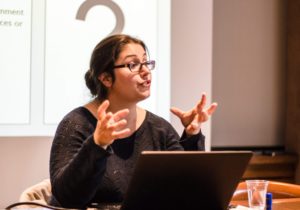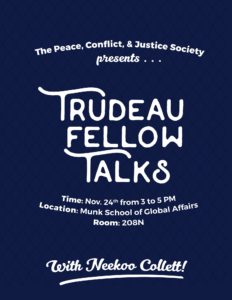The Trudeau Centre Fellow in Peace, Conflict and Justice is for Political Science doctoral students at the University of Toronto who are conducting research in areas related to peace, conflict and justice. You can read about our three PCJ fellows here.
The recipients of this award become fellows of the Centre and have the opportunity to participate in its academic life. This includes presenting about their research at a ‘Trudeau Fellows Talk’ organized by the PCJ Society.
Undertaking the PhD program is by no means a small undertaking. It requires a deep fascination in a particular subject area and a curiosity that always encourages you to want to learn more. However, above all else, it truly requires passion. In attending Neekoo Collett’s Trudeau Fellows Talk, her passion for her research was evident, and inspiring.
To some extent, Neekoo suggests that her research really began back in her undergraduate at the University of Alberta. In completing the Honours program, she had to write an undergraduate thesis and began asking questions about genocide: what it is, why it happens, and how it can be prevented. These questions would take her to both Rwanda and Bosnia for field experience; experiences that truly devastated her in seeing the mass graves and the horrors in the eyes of survivors. While everyone optimistically says that it will never happen again, Neekoo wanted to do whatever she could to make genocide an atrocity confined to the history books.
After completing the Masters of Global Affairs program at the Munk School, Neekoo is now a PhD candidate in political science. Her research focuses on the persecution of religious minorities, specifically asking two questions with respect to the persecution of Baha’is in Iran:
- Why do governments expend the cost of persecuting religious minorities who pose no material threat to the regime? In the case of Iranian Baha’is, what explains the Iranian government’s decision to expend resources persecuting a group that comprises <0.6% of the population, is generally apolitical, and has no special access to power or resources?
- Why do governments choose certain strategies of persecution over others? In the case of Iranian Baha’is, what explains the Iranian government’s variation in the tactics used to persecute Baha’is (ex. moving from state-sponsored executions to a “revolving door” arrest strategy)?
 Her interest in the persecution of Iranian Baha’is is not strictly academic – her mother’s family are Baha’is and she still has family living in Iran. As a result, the sad reality of her research hits very close to home. It was interesting to hear how Neekoo acknowledges this to be both a benefit and a challenge. While the family ties certainly fuel her passion and provide her with excellent contacts within the Baha’i community, as an academic, it is also important to remain impartial and pragmatic.
Her interest in the persecution of Iranian Baha’is is not strictly academic – her mother’s family are Baha’is and she still has family living in Iran. As a result, the sad reality of her research hits very close to home. It was interesting to hear how Neekoo acknowledges this to be both a benefit and a challenge. While the family ties certainly fuel her passion and provide her with excellent contacts within the Baha’i community, as an academic, it is also important to remain impartial and pragmatic.
More generally, hearing about Neekoo’s research process provided great insight into the journey she has taken to develop the right questions and begin searching for relevant information. Research certainly is not a linear process. Different questions would lead Neekoo to look for information from different sources, then that information often would lead to a reshaping of the very questions she was asking. In her talk, Neekoo spoke to the various theories she developed and discussed the prospects and limitations of each. She even drew on the audience of PCJ students to challenge her with questions and suggest other ideas. I left Neekoo’s talk with a new understanding of research: more than just being lost in books and journal articles, it serves to document the conversations of the day.
Thanks, Neekoo, for sharing your story. I look forward to following your research journey and can’t wait to see where it may lead!
